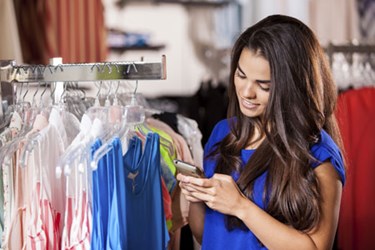Are You Ready For Beacon Technology?
By Hannah Ash, contributing writer

By Ally Orlando, contributing writer
You have probably heard what innovative businesses such as Tesco, Aloft Hotels, and Kenneth Cole are doing with beacon technology. Beacon technology, such as iBeacon, is an indoor positioning system that uses transmitters and Bluetooth low energy to send push notifications to devices in close proximity.
“From an in-store merchandising perspective, iBeacon has the potential to increase ROI and make even non-interactive displays ‘smarter,’” Ron Bowers, senior vice president of business development of Frank Mayer and Associates, says in an Integrated Solutions for Retailers article.
“A beacon could be built into a display or interactive piece that intercepts shoppers in close proximity to the unit or upon entering a store or department. It could send a prompt to engage, a purchase incentive, or information,” Bowers explains.
There are a variety of potential applications for this technology. Tesco is testing iBeacon technology, offering alerts and click-and-collect orders, to support customer personalization. The company eventually plans to add more personalized elements, such as giving consumers the ability to locate products on their shopping lists.
Aloft Hotels is testing the technology to enable hotel guests to unlock doors using their mobile devices.
Retailer Kenneth Cole saw an increase in app open and offer redemption rates after employing iBeacon technology.
According to a Get Elastic article based on a 2014 Forrester research report, beacons can also be also be used to dispatch sales associates to store departments and collect data on in-store behavior to optimize marketing efforts.
David Edelman, partner and global co-leader of digital marketing and sales practice at management consulting firm McKinsey & Company, provides a crucial piece of advice in an interview with eMarketer: inventory visibility is vital to iBeacon applications.
“If there isn’t a digitized store planogram, it’s impossible to do an iBeacon-type rollout. Retailers first have to know where everything is on the shelf, in every one of their stores,” he tells eMarketer’s Yory Wurmser.
Edelman says he expects retailers to gradually adopt iBeacon. In the interview with eMarketer, he predicts that 2014 will be a year of experimentation for proximity marketing technologies. He notes that companies with a history of employing data-driven marketing tactics are likely to be at an advantage; they could have many of the necessary capabilities already in place.
